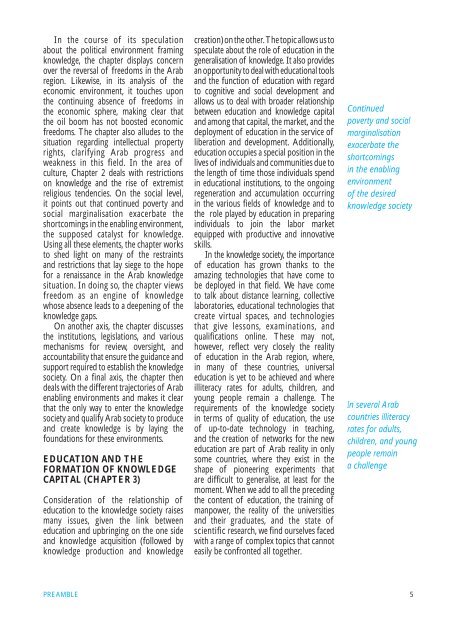Arab Knowledge Report 2009: Towards Productive
Arab Knowledge Report 2009: Towards Productive
Arab Knowledge Report 2009: Towards Productive
- No tags were found...
You also want an ePaper? Increase the reach of your titles
YUMPU automatically turns print PDFs into web optimized ePapers that Google loves.
In the course of its speculationabout the political environment framingknowledge, the chapter displays concernover the reversal of freedoms in the <strong>Arab</strong>region. Likewise, in its analysis of theeconomic environment, it touches uponthe continuing absence of freedoms inthe economic sphere, making clear thatthe oil boom has not boosted economicfreedoms. The chapter also alludes to thesituation regarding intellectual propertyrights, clarifying <strong>Arab</strong> progress andweakness in this field. In the area ofculture, Chapter 2 deals with restrictionson knowledge and the rise of extremistreligious tendencies. On the social level,it points out that continued poverty andsocial marginalisation exacerbate theshortcomings in the enabling environment,the supposed catalyst for knowledge.Using all these elements, the chapter worksto shed light on many of the restraintsand restrictions that lay siege to the hopefor a renaissance in the <strong>Arab</strong> knowledgesituation. In doing so, the chapter viewsfreedom as an engine of knowledgewhose absence leads to a deepening of theknowledge gaps.On another axis, the chapter discussesthe institutions, legislations, and variousmechanisms for review, oversight, andaccountability that ensure the guidance andsupport required to establish the knowledgesociety. On a final axis, the chapter thendeals with the different trajectories of <strong>Arab</strong>enabling environments and makes it clearthat the only way to enter the knowledgesociety and qualify <strong>Arab</strong> society to produceand create knowledge is by laying thefoundations for these environments.EDUCATION AND THEFORMATION OF KNOWLEDGECAPITAL (CHAPTER 3)Consideration of the relationship ofeducation to the knowledge society raisesmany issues, given the link betweeneducation and upbringing on the one sideand knowledge acquisition (followed byknowledge production and knowledgecreation) on the other. The topic allows us tospeculate about the role of education in thegeneralisation of knowledge. It also providesan opportunity to deal with educational toolsand the function of education with regardto cognitive and social development andallows us to deal with broader relationshipbetween education and knowledge capitaland among that capital, the market, and thedeployment of education in the service ofliberation and development. Additionally,education occupies a special position in thelives of individuals and communities due tothe length of time those individuals spendin educational institutions, to the ongoingregeneration and accumulation occurringin the various fields of knowledge and tothe role played by education in preparingindividuals to join the labor marketequipped with productive and innovativeskills.In the knowledge society, the importanceof education has grown thanks to theamazing technologies that have come tobe deployed in that field. We have cometo talk about distance learning, collectivelaboratories, educational technologies thatcreate virtual spaces, and technologiesthat give lessons, examinations, andqualifications online. These may not,however, reflect very closely the realityof education in the <strong>Arab</strong> region, where,in many of these countries, universaleducation is yet to be achieved and whereilliteracy rates for adults, children, andyoung people remain a challenge. Therequirements of the knowledge societyin terms of quality of education, the useof up-to-date technology in teaching,and the creation of networks for the neweducation are part of <strong>Arab</strong> reality in onlysome countries, where they exist in theshape of pioneering experiments thatare difficult to generalise, at least for themoment. When we add to all the precedingthe content of education, the training ofmanpower, the reality of the universitiesand their graduates, and the state ofscientific research, we find ourselves facedwith a range of complex topics that cannoteasily be confronted all together.Continuedpoverty and socialmarginalisationexacerbate theshortcomingsin the enablingenvironmentof the desiredknowledge societyIn several <strong>Arab</strong>countries illiteracyrates for adults,children, and youngpeople remaina challengePREAMBLE5
















